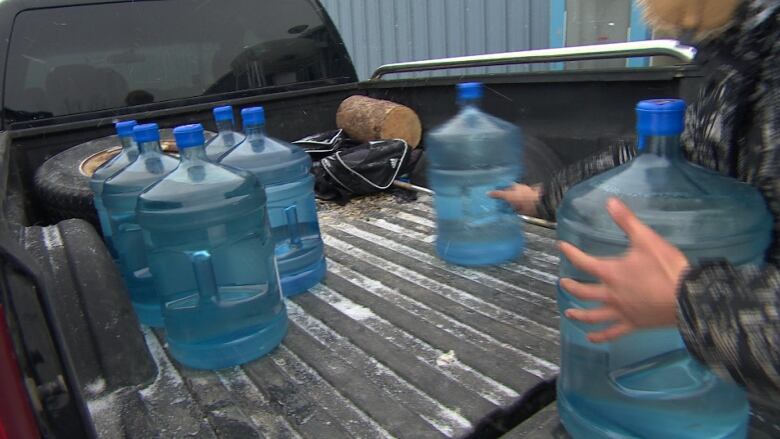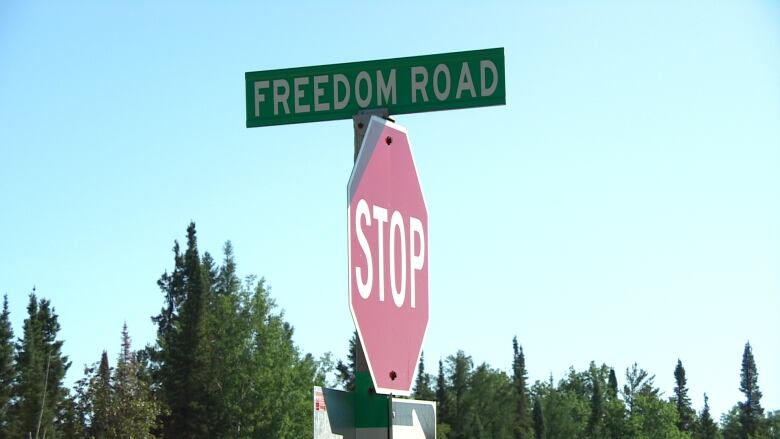Road to isolated Shoal Lake First Nation a long-awaited step in tangled history
Political ambivalence, self-interest have delayed remedies for Shoal Lake 40

The Shoal Lake 40 First Nation, on the Manitoba-Ontario border,is finally getting itsroad, a step towardending years of isolation.
Sources of have told CBC News theindigenous affairs minister, premier of Manitoba, mayor ofWinnipeg and chief of Shoal Lakewill announce theirco-operationon theconstruction of a $30-million access road, dubbed Freedom Road, at a newsconference this morning in Winnipeg.
Constructionis planned tobegin in early 2016, with the approximately26-kilometre road to be completed in 2017.
- City committee OK's $1M funding for Shoal Lake road design
- Pressure mounts to build road for Shoal Lake 40 First Nation
- The price of Winnipeg's water: one reserve's man-made misery
- Shoal Lake 40 and Winnipeg's drinking water: What's at stake?
A centuryago the communitywas left isolatedby the construction of the intake of Winnipeg's water system. Today that isolationhasalso left the community without clean drinking water of itsown.
In recent years,that bitter irony has generated considerable public and political support for the First Nation.
Prime Minister JustinTrudeau, Manitoba Premier Greg Selinger and Winnipeg Mayor Brian Bowman have allsaid there is a moral obligation to rectify the situation.
While the deal to construct a road has beendecades in the making, this isn't the first time there hasbeen an attempt at a solution.
Information obtained by CBC News, including federal ministerialbriefing documents, illustrateshow political ambivalence and the interests of two First Nations have delayed a remedy.
Water source for Winnipeg
In the early 1900s,Winnipeg, then Canada's third-largest city, was booming and in need of a reliable source of clean water.

In1915, the City of Winnipeggot approval to draw water from Shoal Lake from the Ontario government.
With little regard forthe area's indigenous inhabitants, land was expropriated from what is now the Shoal Lake 40 First Nationfor the construction of awater intake, whichrequired digging acanal that cut off the communityfrom the mainland.
Shoal Lake 40 First Nation has been on an island ever since.
Just15 kilometresoff the Trans-Canada Highway, today it remains accessible only by boat in the summerand an iceroadinwinter.
For decades, Winnipegfought all efforts to build a road to Shoal Lake, fearing development would threaten its water supply.
The resultingisolation has madethe cost of building a water treatment plant prohibitive.
While the Shoal Lake 40 First Nation sends water to Winnipeg,it's been on a boil-water advisory since December 2000.
A bridge not built
That could have changed in 2001, as thethenLiberal federal government proposed to build a bridge from Shoal Lake 40 to the mainland throughthe neighbouring IskatewizaageganFirst Nation (also known asShoal Lake 39).
Not wanting a public right-of-way through its lands, IskatewizaageganFirst Nationvoted against it, killing the bridge proposal.(Iskatewizaagegandid not respond to an interview request)
IskatewizaageganFirst Nationhas since imposed tariffs on anyone trying to reach Shoal Lake 40 through its lands, via ice road or ferry.
In 2003, Shoal Lake 40 turned its attention to the building of a roadthat would bypass Iskatewizaagegan First Nationentirely.
Over the next few years, itbegan negotiating with the federal government first the Liberals, then the Conservatives for a deal on a proposed $30-millionroad.
An engineering firm identifiedfourdifferent routes anda preferred option was presented to the Conservatives in2007.Twoyears laterit was denied over"a lack of sufficient environmental information," according to federal documents.
Shoal Lake and its engineers disputed that assessment, but started over, ultimatelyselecting the current proposed Freedom Road route.
In 2013 Manitoba and the City of Winnipeg each committed $1 million to the design of Freedom Road.
The federal government made a similar commitment a year later, but unlike Manitoba and Winnipeg, it did not express a commitment to construction.
Briefing notes obtained by CBC News that were prepared in May 2015 for former aboriginal affairs minister Bernard Valcourt say that a "formal funding commitment was unachievable" and that the department was looking to find other sources of funding through other government programs.
During the fall 2015 election the Liberals committed to funding construction.
Clean water delayed
Much of the attention now being paid toShoal Lake 40focuses on how it provides water to Winnipeg, but has no water treatment plant itself.
Federal documentsshow taxpayers have spentat least $1.3 million since 2000to provide the community with bottled water.
As negotiations over the road dragged on,the Conservative government did make an offer to address the issue of clean water in 2010.
It approved$9.2 millionfor the construction of a water treatment plant to be built on lands shared by Shoal Lake 40 and Iskatewizaagegan First Nation.Anagreement over land use andjoint-governance of the facility couldn't be reached.
Like the bridge proposal, federal documents sayIskatewizaagegan First Nation struck the shared treatment plantdown.
Ottawa then deemed the $13.7-million dollar cost of building a treatment plant on land owned by Shoal Lake 40 too expensive, deferring funding until after 2015.
It also recommended Shoal Lake 40 and Iskatewizaagegan First Nationmediate a solution.
Neither community has agreed.
Shoal Lake 40 has not reapplied for funding, pending a deal to build Freedom Road.












_(720p).jpg)


 OFFICIAL HD MUSIC VIDEO.jpg)
.jpg)



























































































